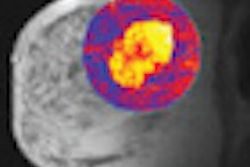Women with dense breasts have a more than threefold risk of breast cancer compared to women with lower breast tissue density, according to a study published online Wednesday in the Journal of the National Cancer Institute. And these women's tumors are more likely to have certain aggressive characteristics than those found in women with less dense breasts.
Although breast tissue density has been increasingly acknowledged as a risk factor for breast cancer, it has remained unclear whether breast density is associated with specific tumor characteristics and types, according to lead study author, Rulla Tamimi, ScD, of Harvard Medical School and Brigham and Women's Hospital.
"Women with breasts of 75% or greater percent density are at four- to sixfold greater risk of breast cancer compared with women with more fat tissues in the breasts," the authors wrote. "[But] it is poorly understood whether breast density differentially affects the risk of certain pathological subtypes of breast cancer."
Tamimi and colleagues compared breast density in 1,042 postmenopausal women with breast cancer -- diagnosed between June 1989 and June 2004 -- and 1,794 matched control subjects; that is, women who were similar in terms of age, postmenopausal hormone use, and other factors but who did not have breast cancer (JNCI, July 27, 2011).
Women in the study cohort had a higher median percent breast density (27.8% compared to 20.5%, p < 0.001). There were also more women with greater breast density in the study cohort: Those with 50% or greater density made up 16.4% of the cohort, compared with 9% in the control group; those with density between 25% and 49% made up 39.7% of the cohort, compared with 30.6% in the control group.
The researchers found that the risk of breast cancer was 3.39-fold in women with 50% or greater breast density, when compared to women with 10% or less breast density. The associations between breast density and breast cancer were stronger for larger tumors than for smaller tumors; for high-grade than for low-grade tumors; and for estrogen receptor-negative than for estrogen receptor-positive tumors, according to the authors.
In an editorial about the study, Dr. Karla Kerlikowske, of the University of California, San Francisco, and Amanda Phipps, PhD, of Fred Hutchinson Cancer Research Center, cautioned that the association between breast density and estrogen receptor-negative tumors could be due in part to a masking effect. Cancerous tissue and mammographically dense tissue have similar x-ray attenuation, which allows tumors to go undetected on screening mammography and progress to a more advanced and aggressive stage before finally being identified.
Tamimi's group also found that the link between density and breast cancer appeared to be stronger for ductal carcinoma in situ (DCIS) than for invasive tumors. There was no association, however, between density and other markers of tumor aggressiveness, such as nodal involvement and HER2 status.
Why the association between breast density and DCIS? Perhaps because of the difference in cancer detection rate in women with denser breasts, according to the authors.
"It is well known that the sensitivity of mammography is lower for women with dense breasts, and women with dense breasts are more likely to have an abnormal mammogram and undergo biopsies than women with fattier breasts," they wrote. "[It's] possible that the diagnosis of in situ carcinomas for many of these women is a serendipitous finding."




















